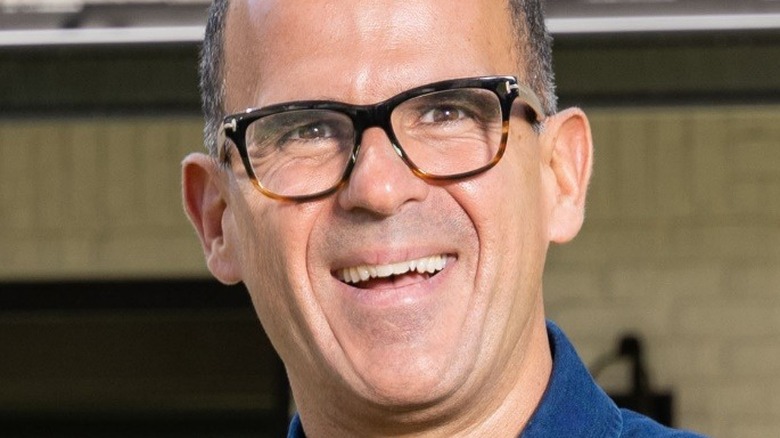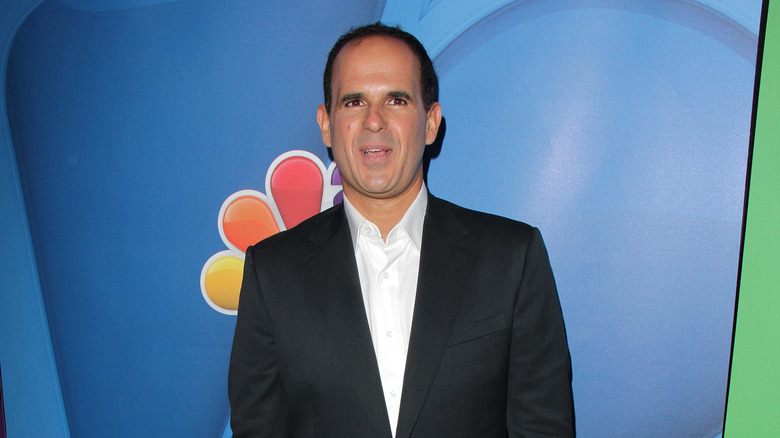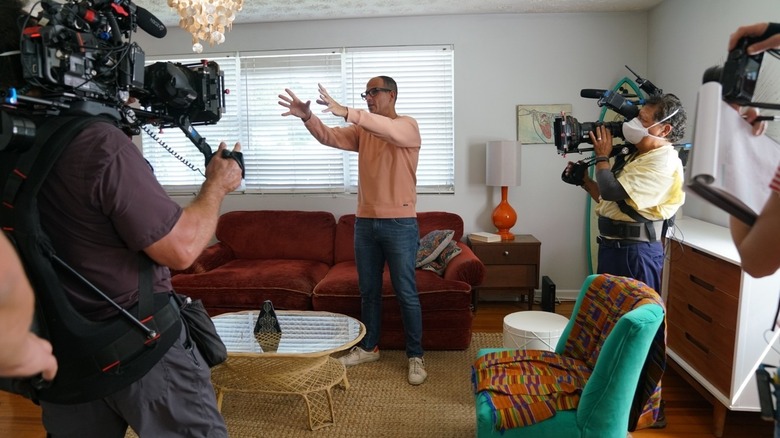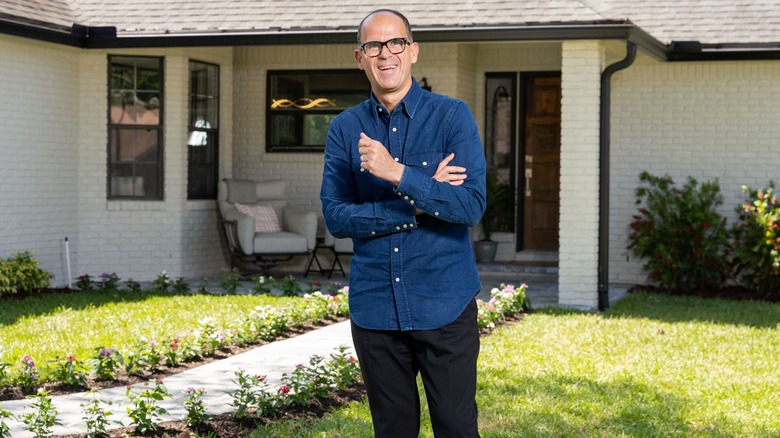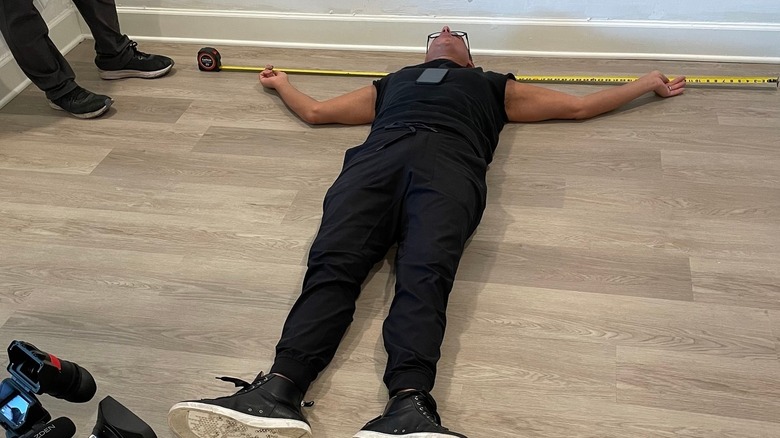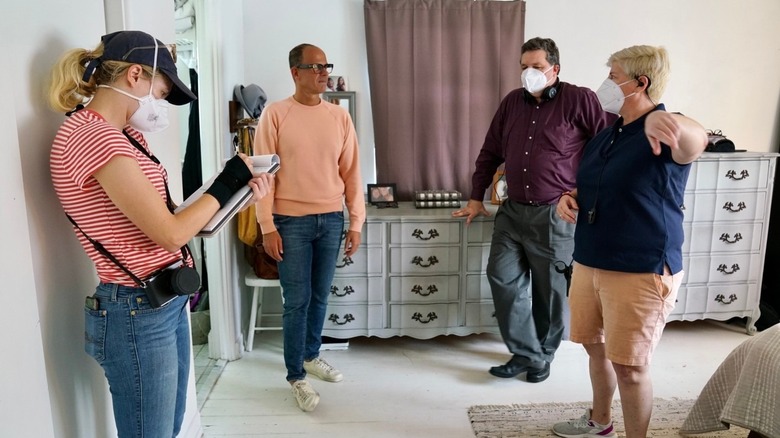The Renovator Host Marcus Lemonis Talks The Value Of Home Ownership - Exclusive Interview
Some might think "The Profit" star Marcus Lemonis seems like a fish out of water in his new HGTV show "The Renovator," but at the end of the day, a successful renovation boils down to results. And while any renovator worth their salt can redesign a room to boost a home's resale value, it takes a visionary to transform a family's life through thoughtful design while increasing the value of their most important asset. However, in the process, sometimes it's necessary to tear down some walls — both physical and emotional.
In his new show, the entrepreneur, CEO, and philanthropist is all business when overseeing ambitious renovation projects that build generational wealth for struggling families. But a home is a whole lot more than a roof over some walls, so sometimes relationships need to be fortified and repaired for the process to truly be a success. In an exclusive interview, we sat down with Lemonis to discuss the business side of home ownership and the ways in which homeowners can improve their family life through design.
How Marcus Lemonis became the Renovator
Most people know you for your show "The Profit" as well as your role as CEO at Camping World and other companies. What gravitated you to the world of interior design and home renovation?
After doing "The Profit" for a decade and over 100 episodes, I started to keep track of the commonality between the businesses that were excellent and the businesses that were struggling and realized that there was a common theme of what was going on in their personal and in their home life. There tended to be some crossover there.
As we went into the pandemic and we all got locked up with our families, we started to also recognize that was something that was unusual for us. How do we live in our space? How do we cohabitate with people? How do we create new traffic patterns? When I put all those thoughts together, I sat down with HGTV and said, "I'd really like to create a show that taps into the inner issues inside of the four walls of the home. I want to renovate their house with them, not for them, and use the renovation to solve their own personal or family conflict or issues."
In the first episode, we have a husband and wife who see the world very differently with how they keep their house. That was one issue. The underlying issue underneath that was that they acknowledged that one doesn't feel loved and one doesn't feel appreciated and respected. We had to unpack that. The third issue was that they didn't agree with how they raised the kids.
When most people go to watch the show, they think they're going to be getting a traditional home renovation show. What they're going to get is a full-scale, wall-to-wall renovation, but I'm going to do it with the family and we're going to solve and work on the family's issues by doing activities inside the house. Unlike a traditional show, the homeowner doesn't actually leave and come back. They stay with me the entire time, and they go through every single process and every single exercise. We do things together in an effort to help them fix whatever issues they've been dealing with on an individual basis.
Conducting research before your home renovation
Customer and employee research is incredibly important when running a business. In that vein, what are some of the most important things to research before renovating or redesigning one's home?
In order to make sure that efficiency happens at the renovation, you've got to understand the local market. You can take a one-mile radius or even lower around your home to see what homes have sold for and what homes are selling for.
The second thing that I love to do is analyze the price per square foot and look at all the homes in that radius — what they have sold for per square foot and what they're asking per square foot. I also encourage people who are getting ready to renovate their home to go look at any new construction in the area to understand what you're competing with.
Go in as a potential buyer and understand — what are the new trends in kitchens? What are we seeing in bathrooms? What are we seeing in storage? What's happening in the garage? What's happening with landscaping? Make sure that if you're going to make certain modifications to your house, you've taken in all these alternate factors regarding the market, your competition, and the local neighborhood.
The next thing, and maybe the last thing and the most important, is making sure that everybody in the house feels represented in that process. If one person wants to build a sports bar and the other person wants to build an exercise room, you're going to have to figure out how you find that compromise there and where the value is going to be added. But every decision can't be based solely on financials. It also has to be based on what's going to bring the most joy and the most value to your relationship inside of your home.
Value-adds inside and outside the home
You've said about filming "The Renovator" that some of the families "need someone on their side to provide solutions that transform their homes into ideal spaces." What are some common issues that less-than-ideal home designs can cause for families?
The first issue is understanding the importance of maintenance and understanding that the idea around building value in your home isn't just building and expanding your house. The second thing is everybody believes that they need to make their house bigger to make it work, and that isn't always necessarily true. The last thing is that people often, when they do renovations, forget to take into account all of the people that live there and make sure that everybody's needs are addressed in one way or the other. When that doesn't happen, it creates a lot of unnecessary tension.
When you think about how a family — your family, my family, the family we grew up in with our parents — we evolved with the family. We were little kids, then we were medium kids, then we were big kids, and then we were adults. There's a way that our house with our parents or the way that our house with their own families — until they progress — changes, and that flow changes.
When we go in to do a renovation, I want people to be smart about those things that I mentioned: managing your budget based on the marketplace, making sure that it's participative, and making sure that you're getting the basics done before getting the luxuries done. But if all those things are done without full participation from everybody in the house, it's probably not going to work. That's one big difference that you'll see — I pulled people along to ensure that everybody contributed.
Sometimes, what is outside of the home can make just as large of an impact as the interior. What tips can you give on redesigning outdoor spaces with functionality and ROI in mind?
I never look at a piece of property as just the four walls of the home. I tell homeowners all the time, "It's the four corners of your property, not the four walls of your house." When you think about creating value for your home or preserving value for your home, or more importantly, enjoying your home, you want to be able to have that space be much bigger than just the four walls of the home.
I like the outside space to have easy access. I like it to be functional. I like it to have a community environment feel, where a lot of people can congregate at one time, but I also think it's important that people take pride in their home — something as simple as cutting the grass, keeping your driveway washed down, keeping your windows clean, your hedges trimmed, your weeds pulled.
Those seem like small details, but to preserve value for a potential appraiser or a potential buyer or your own balance sheet, you know when it's worth more and when it's worth less. You're going to see some very specific episodes of how homeowners have destroyed the value of their house, and how we work to revive it and improve it to a higher level than they ever thought was possible.
The business of home ownership
In the world of business, profit tends to trump all. How can homeowners ensure their renovation plans will not only be rewarding but profitable?
You've got to go into it with a dual frame of mind. In order to make sure that it doesn't become profit-wins-all, you have to make sure that you're addressing how the family lives. You have to make sure that everybody in the house ... has their issues being addressed.
The second thing is, when you create that plan, everybody should be at least knowledgeable about what the plan is. Lastly, that plan has to come with eyes wide open around the financial requirements to get that done. You want to make sure that people don't find themselves in a situation where they're signing up for something they can't handle.
From a business standpoint, I look at the house like a business. When I look at a business, I see the profit and loss statement. When I look at a house, I see money coming in — that's the income that we all generate in different forms and fashions — and I see money going out, and those are the expenses, the mortgage, the rent, the taxes, the maintenance, the food, all the things that go on with the house.
At the end of every month, you know if your home is profitable or not. If more money came in than what went out, you're in good shape. If the opposite happens, you're having to find ways to fill that gap, either through second mortgages or credit card debt. I always want to caution people to understand the financial literacy about where they're at as a homeowner before they do anything [like] taking on more obligations that [they] can't fulfill today.
It's clear that your expertise as a businessperson informs your philosophy on design. In what way is structuring a successful business similar to designing a home?
I never want to draw too much of a parallel between a business and a home because we share meals with our families and our kids and holiday celebrations. There's a lot of love inside of those walls, but I look at the homes [in] two ways: one, as the domicile for your family to share and to love; the second is as the most important asset that you're ever going to buy. When you buy that asset, there are certain responsibilities and ... requirements to owning that asset, maintaining it, preserving it, and enhancing it.
I often find people that don't see that same value, so I try to reframe it for them by explaining that the generational wealth they are ultimately trying to create can't be realized without them looking at their house differently. We deal with a lot of financial literacy issues in these episodes. We deal with full transparency around money. We deal with values and we deal with the efficiency of, how do we make sure that we do a renovation that makes us money, but how do we also satisfy every person that lives in that home, including the kids?
Managing relationships in the home
What are some key ways homeowners can keep their families happy during a major home renovation?
Depending on the scope, it may be a good idea to find temporary housing. Trying to live in the middle of a construction zone creates unnecessary tension, creates sleepless nights, and changes your pattern of behavior, and it'll lead to some level of unhappiness.
The second thing is that no matter how big or small your kids are or whether your in-laws live there, make sure that everybody in the household gets at least one item addressed that they're looking for so they feel like it's a collaborative process. Too often, I've made the mistake in my own life where something will happen and not everybody has input, and then nobody's embracing it. Make sure that people feel embraced.
The last thing is to make sure that everybody understands what the budget is and why the budget is what it is, and that there's no necessity to violate that budget unless everybody's on the same page. We know that money is always a sore spot for couples. We don't need the home construction and money to compound that tension. That happens a lot.
It's normal for growing families to outgrow their homes. Are there ways in which homeowners can maximize their home's available space while bringing the family together?
The first episode is a perfect example of that. We added a full bedroom without actually breaking an exterior wall of the home. We had to reconfigure the space in a way that worked for everybody. Ultimately, understanding where the pain points are from a space standpoint is step one. Understanding what sacrifices you may have to make to solve those pain points is a collaborative thing. There are going to be situations, as I've said before, where somebody isn't going to be thrilled, which is why you have to make sure that everybody gets at least something.
In this first episode, we added $100,000 of value by taking a single space that was underutilized and transforming it into something totally different, solving all the pain points for the family. It literally changed their life from our perspective.
New episodes of "The Renovator" will now be available on discovery+ the same day they premiere on HGTV.
This interview has been edited for clarity.
